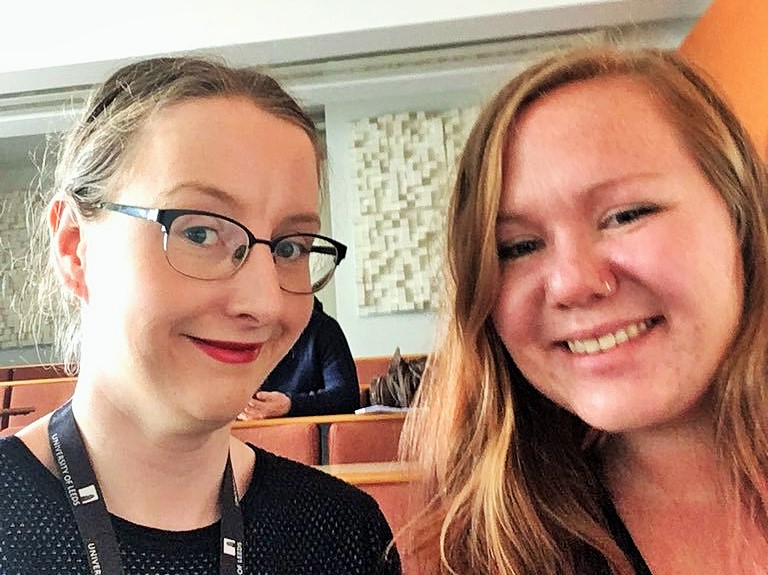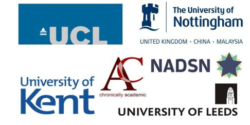Ableism in Academia
Written by Hannah McGurk, Rebecca Porter, Leonora Gunn

The inaugural Ableism in Academia conference took place 23rd March 2018 at University College London. The event was co-sponsored by the Centre for Disability Studies (CDS) and Faculty of Education, Social Sciences and Law, University of Leeds. CDS PhD student, Gillian Loomes, spoke at the event. It was also attended by three MA students associated to the CDS: Leonora Gunn, Hannah McGurk and Rebecca Porter. There were a wide range of topics considered during this event, from grief, loss of voice, colour-blindness, chronic illnesses, amongst many more. In this blog post Leonora, Hannah and Rebecca provide a summary and reflection on the event.
Fiona Kumari Campbell, the Keynote Speaker at this event and author of Contours of Ableism, began the conference with a fascinating talk about the very concept of ‘ableism’. She discussed how ableism occurs at multiple levels, including not merely in relation to the physical environment and our use of technology, but also with regard to how disabled people negotiate, mix or communicate with other people. Ableism is an industrial-level concern, as the very idea centres around what it means to be ‘productive’. She ended with the argument that the focus on ‘reasonable adjustments’ needs to shift instead to ‘access rights’ if disabled people in academia are to have their needs met. The discourse should centre on inclusion, rather than holding people to a rigid academic standard.

Image advertising conference, showing all sponsors.
A wide range of issues that disabled academics face were raised throughout the conference. For instance, the issue of whether (and how) to access support an individual must disclose their impairment. Assumptions are also a barrier, whereby sometimes an institution assumes what a person needs. Even before this, individuals may need support to access disability support and to complete what are often a series of stressful forms, or to negotiate Disabled Students allowance or Access to Work schemes. Added to this is the notion of a ‘glass infrastructure’ – whereby disabled people cannot move up in their career, because having already negotiated and organised adjustments and access in their current job role these would/might not be in place in a new position.
Another topic was the use of notions of academic ‘excellence’ and ‘rigour’. Excellence is often measured in terms of certain outputs, which excludes disabled people who may take longer to complete certain tasks. In terms of ‘rigour’, this tends to mean attention to detail which values and devalues certain kinds of research and experiences. As well as this, cognitive dexterity and loss of space can occur if someone is disabled/impaired. There is a toxic trend in the academic community of normalising tiredness and stress and treating them as part and parcel of being an academic. This puts pressure on disabled academics to accept unreasonable and unmanageable workloads, which in turn interacts with ‘compulsory gratuity’ - the expectation that disabled people should be grateful for adjustments and accommodation that really amount to the bare minimum, or even less than that. This prevents disabled academics from asking for more support, even when they desperately need it.
In fact, this working environment is harmful not just to those who identify as disabled, but to everyone. The system doesn’t work for anyone unless they’re having a good day. There is an insidious assumption in institutional academia that we are all ‘normal’. For example, in Jeanne Barczewska’s talk she discussed the culture of ‘no voice, no brain’ – the ways in which lack of a physical voice can lead to her contributions and ideas being ignored and undervalued. Improving access will benefit more groups than just the individual – Jeanne did not expect other people, like her students with hearing impairments, or students who are quietly spoken, to benefit from her microphone that she had to purchase – yet we suggest that it may well do just that.
Social media and spaces for academic community (although they have potential to be inaccessible) were also discussed. Disabled academics can feel isolated, but social media can connect them, providing a sense of community. Examples of this included the development of the hashtag #autisticsinacademia on Twitter, and a ‘Depressed Academics Blog’ , that provides peer-to-peer support.
Disability can shape an academic’s career, in ways that often go unrecognised. Oliver Daddow’s colour blindness makes certain representations of quantitative research that use colour totally inaccessible and yet he finds his condition is often treated as a joke. Disabled academics can find themselves excluded in myriad ways that their colleagues may not even recognise as exclusion. In one presentation the authors shared a comment that had been made, flippantly, to them: ‘All the best conversations take place on the stairwells’. But of course, not everyone can access stairwells. The idea that disability is not static was also raised in several talks. Fluctuation in impairment and the ‘shaded area’ between health and sickness, as well as breaking down the binary of being ‘well’ or ‘sick’, particularly in cases where a person’s impairment is invisible were discussed.
We enjoyed this event and found it thought-provoking and welcoming. Accessibility is not just about getting there; it’s about the provision of interpreters, captions, food appropriate to many restricted diets and so on. The event’s organisers had taken all of this into consideration to make the day accessible to and enjoyable for everyone.
Link to the video recording of the event: https://www.youtube.com/watch?v=6ZScXkO40Pk
For ease of access, here is the programme with associated timings of speakers:
| Keynote: Fiona KUMARI-CAMPBELL
Policy and legal responses to social inclusion |
Starts at: 00:07 to 00:52 |
| Nicki MARTIN
The Leadership Foundation for Higher Education research |
Starts at: 00:56 to 01:12 |
| Wendy MERCHANT
Excellence, Rigor and Resilience |
Starts at: 01:29 to 01:38 |
| Rosalind JANSSEN
Living with microscopic colitis |
Starts at: 01:38 to 01:46 |
| Gillian LOOMES
The questioning aspie |
Starts at: 01:47 to 01:59 |
| Ian GENT
Depressed academics |
Starts at: 02:00 to 02:09 |
| Carla FINESILVER
Invisible disability, unacknowledged diversity |
Starts at: 02:10 to 02:20 |
| Q&A session | Starts at: 02:20 to 02:44 |
| Thomas KADOR
Academics who can't read (remote) |
Starts at: 03:33 to 03:40 |
| Ben LUNN
Ableism in Music Academicism (remote) |
Starts at: 03:40 to 03:48 |
| Jeanne BARCZEWSKA
Teaching voice |
Starts at: 03:48 to 03:56 |
| Oliver DADDOW
Colour blindness and accessibility in academia |
Starts at: 03:56 to 04:05 |
| Jennifer RODE
Greyhound racing and the academy (remote) |
Starts at 04:06 to 04:07 |
| Elisabeth GRIFFITHS
Invisible disabilities, disclosure and being an ‘insider’ in disability research |
Starts at: 04:08 to 04:16 |
| Jason DAVIES
Disabling grief in academia |
Starts at: 04:16 to 04:24 |
| Comments and discussion | Starts at 04:25 to 05:00 |
| Prof Michael ARTHUR, President and Provost of UCL
Closing words |
Starts at 06:29 to end |
Authors
Hannah McGurk
MA Disability Studies Student
Rebecca Porter
Doctoral Research Student
Leonora Gunn
MA Student
